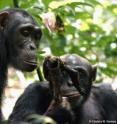Meat for sex in wild chimpanzees
Related images
(click to enlarge)
Wild female chimpanzees copulate more frequently with males who share meat with them over long periods of time, according to a study led by researchers from the Max Planck Institute for Evolutionary Anthropology in Germany, published in the open-access, peer-reviewed journal PLoS ONE April 8, 2009. How females choose their mating partners and why males hunt and share meat with them are questions that have long puzzled scientists. Evidence from studies on human hunter-gatherer societies suggest that men who are more successful hunters have more wives and a larger number of offspring. Studies of wild chimpanzees, humans' closest living relative, have shown that male hunters frequently share meat with females who did not participate in the hunt. One of the hypotheses proposed to explain these findings is the meat-for-sex hypothesis, whereby males and females exchange meat for mating access. However, there has been little evidence in both humans and chimpanzees to support it.
In recent research conducted in the Taï National Park, Côte d'Ivoire, Cristina M. Gomes and Christophe Boesch show that female chimpanzees copulate more frequently with males who share meat with them on at least one occasion, compared with males who never share meat with them, indicating that sharing meat with females improves a males' mating success. Although males were more likely to share meat with females who had sexual swelling (i.e. estrous females), excluding all sharing episodes with estrous females from the analysis, did not alter the results. This indicates that short term exchanges alone (i.e. within the estrous phase of the female) cannot account for the relationship between sharing meat and mating success.
According to Gomes, "Our results strongly suggest that wild chimpanzees exchange meat for sex, doing so on a long-term basis. Males who shared meat with females doubled their mating success, whereas females, who had difficulty obtaining meat on their own, increased their caloric intake, without suffering the energetic costs and potential risk of injury related to hunting."
She adds, "Previous studies might not have found a relationship between mating success and meat sharing because they focused on short-term exchanges; or perhaps because in those groups access to females was driven by male coercion so females rarely chose their mating partners."
Boesch concluded, "Our findings add to the ever-growing evidence suggesting that chimpanzees can think in the past and the future and that this influences their present behaviour."
"These findings are bound to have an impact on our current knowledge about relationships between men and women; and similar studies will determine if the direct nutritional benefits that women receive from hunters in human hunter-gatherer societies could also be driving the relationship between reproductive success and good hunting skills," concludes Gomes.
Source: Max-Planck-Gesellschaft
Articles on the same topic
- Wild chimpanzees exchange meat for sexWed, 8 Apr 2009, 0:21:47 UTC
Other sources
- Wild chimps exchange meat for sexfrom UPIThu, 9 Apr 2009, 19:49:23 UTC
- Study shows chimps exchange meat for sexfrom UPIThu, 9 Apr 2009, 0:49:08 UTC
- Meat for sex in wild chimpanzeesfrom Biology News NetThu, 9 Apr 2009, 0:42:05 UTC
- Lady chimps will mate for meatfrom MSNBC: ScienceWed, 8 Apr 2009, 16:14:56 UTC
- Wild chimpanzees exchange meat for sexfrom PhysorgWed, 8 Apr 2009, 11:14:32 UTC
- Wild Chimpanzees Exchange Meat For Sex, Researchers Findfrom Science DailyWed, 8 Apr 2009, 3:35:14 UTC
- Male chimps exchange meat for sexfrom Sciencenews.orgWed, 8 Apr 2009, 0:56:10 UTC
- Chimps Trade Meat for Sex -- And It Worksfrom National GeographicWed, 8 Apr 2009, 0:42:15 UTC
- Chimpanzees swap meat for sexfrom BBC News: Science & NatureTue, 7 Apr 2009, 23:35:37 UTC
